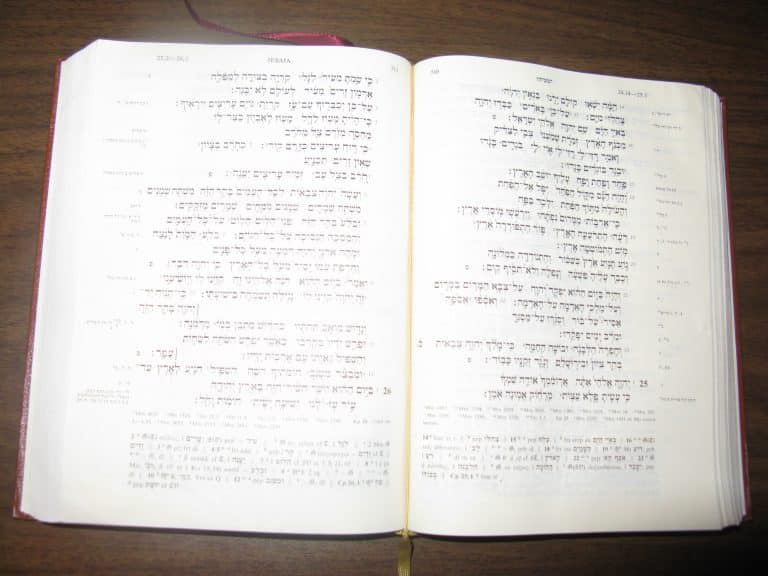Joseph Smith quotes in this lesson can be found at Teaching of the Presidents of the Church: Joseph Smith.
From the Life of Joseph Smith
Among other subjects, Joseph Smith and the other brethren studied Hebrew, the language in which most of the Old Testament was originally written. The Prophet’s journal for this period shows that he studied Hebrew nearly every day, often for many hours a day. His journal entries include words such as “Spent the day in reading Hebrew” or “Attended school and read Hebrew.” On January 19, 1836, he recorded: “Spent the day at school. The Lord blessed us in our studies. This day we commenced reading in our Hebrew Bibles with much success. It seems as if the Lord opens our minds in a marvelous manner, to understand His word in the original language.” A month later, he wrote: “Attended the school and read and translated with my class as usual. My soul delights in reading the word of the Lord in the original.”
Why would someone who had the ability to translate by the power of God be interested in learning ancient languages, and understanding the Bible better through secular training? What might this suggest about the relationship between spiritual and academic learning?Joseph Smith’s experience in the School of the Elders is just one evidence of his love for the scriptures. He studied the scriptures diligently, finding in them solace, knowledge, and inspiration throughout his life. Significantly, it was a passage from the Bible that led him to seek wisdom from God and receive the First Vision when he was just 14 years old (see James 1:5).
Can you relate to this love for the scriptures? What methods of scripture study have you found most helpful?
Teachings of Joseph Smith
The Savior taught in parables so that those who believed in His teachings could gain greater light, while those who rejected His teachings would lose the light they had.
This sounds pretty harsh. Why would the Savior teach in a way that would cause some to lose the light they had?
We again make remark here—for we find that the very principle upon which the disciples were accounted blessed, was because they were permitted to see with their eyes and hear with their ears—that the condemnation which rested upon the multitude that received not His saying, was because they were not willing to see with their eyes, and hear with their ears; not because they could not, and were not privileged to see and hear, but because their hearts were full of iniquity and abominations; ‘as your fathers did, so do ye.’ [Acts 7:51.]
The problem with those who are condemned seems to be lack of belief, a lack of willingness to see. Why is this quality so important? Why might people be unwilling to listen? Do you listen to everyone you encounter who says they have a religious message to share? Should you?
“… Men are in the habit, when the truth is exhibited by the servants of God, of saying, All is mystery; they have spoken in parables, and, therefore, are not to be understood. It is true they have eyes to see, and see not, but none are so blind as those who will not see; and, although the Savior spoke this to such characters, yet unto His disciples he expounded it plainly; and we have reason to be truly humble before the God of our fathers, that He hath left these things on record for us, so plain, that notwithstanding the exertions and combined influence of the priests of Baal, they have not power to blind our eyes, and darken our understanding, if we will but open our eyes, and read with candor, for a moment.”
How do you understand Jesus’ use of parables? Are they supposed to be confusing? What do you make of the fact that Jesus uses examples from his listener’s everyday lives (wheat, seeds, etc.)? (An interesting point here is that the parables include both male and female protagonists.)
Are there times when it’s legitimate to say that something is a mystery, and we can’t understand it?
The parable of the sower shows the effects of preaching the gospel; it also shows that the Savior established His kingdom in the meridian of time.
“But listen to the explanation of the parable of the Sower: ‘When any one heareth the word of the Kingdom, and understandeth it not, then cometh the wicked one, and catcheth away that which was sown in his heart.’ Now mark the expression—that which was sown in his heart. ‘This is he which receiveth seed by the way side.’ [Matthew 13:19.] Men who have no principle of righteousness in themselves, and whose hearts are full of iniquity, and have no desire for the principles of truth, do not understand the word of truth when they hear it. The devil taketh away the word of truth out of their hearts, because there is no desire for righteousness in them.
Why do some people have a “principle of righteousness in themselves,” and others don’t? If someone doesn’t have a desire for truth, is there a way to develop such a desire?
The parable of the wheat and tares teaches that the righteous and wicked will grow together until the end of the world, when the righteous will be gathered and the wicked burned.
“Now we learn by this parable, not only the setting up of the Kingdom in the days of the Savior, which is represented by the good seed, which produced fruit, but also the corruptions of the Church, which are represented by the tares, which were sown by the enemy, which His disciples would fain have plucked up, or cleansed the Church of, if their views had been favored by the Savior. But He, knowing all things, says, Not so. As much as to say, your views are not correct, the Church is in its infancy, and if you take this rash step, you will destroy the wheat, or the Church, with the tares; therefore it is better to let them grow together until the harvest, or the end of the world, which means the destruction of the wicked, which is not yet fulfilled. …
Why doesn’t God keep the wheat “pure” by removing the tares?
In this parable (and others), people seem to be either wheat or tares, righteous or wicked, in one camp or the other. Does this mean we should categorize people in this way?
“ ‘As, therefore, the tares are gathered and burned in the fire, so shall it be in the end of the world’ [Matthew 13:40]; that is, as the servants of God go forth warning the nations, both priests and people, and as they harden their hearts and reject the light of truth, these first being delivered over to the buffetings of Satan, and the law and the testimony being closed up, … they are left in darkness, and delivered over unto the day of burning; thus being bound up by their creeds, and their bands being made strong by their priests, [they] are prepared for the fulfillment of the saying of the Savior—‘The Son of Man shall send forth His angels, and gather out of His Kingdom all things that offend, and them which do iniquity, and shall cast them into a furnace of fire; there shall be wailing and gnashing of teeth.’ [Matthew 13:41–42.]
“We understand that the work of gathering together of the wheat into barns, or garners, is to take place while the tares are being bound over and preparing for the day of burning; that after the day of burnings, ‘the righteous shall shine forth like the sun, in the Kingdom of their Father. Who hath ears to hear, let him hear’ [Matthew 13:43].”
What are our responsibilities now, in the time before the judgment? Do we have responsibilities regarding the tares as well as the wheat?
The parable of the mustard seed teaches that the Church and kingdom of God, established in these last days, will spread throughout the earth.
“The Kingdom of Heaven is like unto a mustard seed. Behold, then, is not this the Kingdom of Heaven that is raising its head in the last days in the majesty of its God, even the Church of the Latter-day Saints, like an impenetrable, immovable rock in the midst of the mighty deep, exposed to the storms and tempests of Satan, that has, thus far, remained steadfast, and is still braving the mountain waves of opposition, which are driven by the tempestuous winds of sinking crafts, which have [dashed] and are still dashing with tremendous foam across its triumphant brow; urged onward with redoubled fury by the enemy of righteousness? …
Why do you think the kingdom is compared to a seed growing into a tree? It’s interesting that Joseph Smith shifts the metaphor to that of a rock. What do these images make you think of?
The testimonies of the Three Witnesses and the latter-day scriptures are like the leaven that was hidden in meal; the parable of the net teaches about the worldwide gathering.
“ ‘Again, the Kingdom of Heaven is like unto a net that was cast into the sea, and gathered of every kind, which when it was full they drew to shore, and sat down, and gathered the good into vessels, but cast the bad away.’ [Matthew 13:47–48.] For the work of this pattern, behold the seed of Joseph, spreading forth the Gospel net upon the face of the earth, gathering of every kind, that the good may be saved in vessels prepared for that purpose, and the angels will take care of the bad. ‘So shall it be at the end of the world—the angels shall come forth and sever the wicked from among the just, and cast them into the furnace of fire, and there shall be wailing and gnashing of teeth. Jesus saith unto them, Have you understood all these things? They say unto Him, Yea, Lord.’ [Matthew 13:49–51.] And we say, yea, Lord; and well might they say, yea, Lord; for these things are so plain and so glorious, that every Saint in the last days must respond with a hearty Amen to them.
What does it mean that the net gathered “every kind”? This is often discussed in terms of geography and the gospel going throughout the world—are there other ways of thinking about it?
This lesson was originally posted as Teaching of the Presidents of the Church: Joseph Smith, Relief Society Lesson 25: Truths from the Savior’s Parables in Matthew 13 on January 9, 2009.






6 Responses
Loved reading thru your lesson in prep. for mine. Thanks so much for the post!! Your questions are thought provoking and inciteful…
Thanks for sharing – this helpd so much!
Can any one help me and explanin the part about the levening how “it is fast levening the lump and will soon leaven the whole”?
Thank you so much for the great insights you have shown on this lesson. I don’t know why, but this lesson has been somewhat difficult in knowing how to present it, and you have certainly helped me.
Shelly, maybe this will help? From Carl B Pratt’s talk “Parables of Jesus: Prophecy for Our Day” (Ensign, Jan 2003)…
The Prophet Joseph Smith saw a special meaning in the Savior’s mention of three measures of meal: “It may be understood that the Church of the Latter-day Saints has taken its rise from a little leaven that was put into three witnesses. Behold, how much this is like the parable! It is fast leavening the lump, and will soon leaven the whole.” 2
As those who bake know, the leaven, or yeast, is a very small part of the recipe to make bread. However, that tiny bit of ingredient is what makes the dough rise so that when it comes out of the oven it is several times its original size and is light and enjoyable to eat.
(I’m going to pass out Friendship Bread recipes… the kind where you let the batter grow for 10 days then divide out three portions and pass it along to friends to grow their own.)
Thanks for your insights. I am very nervous about this lesson. Your questions are great and will help get more class participation.